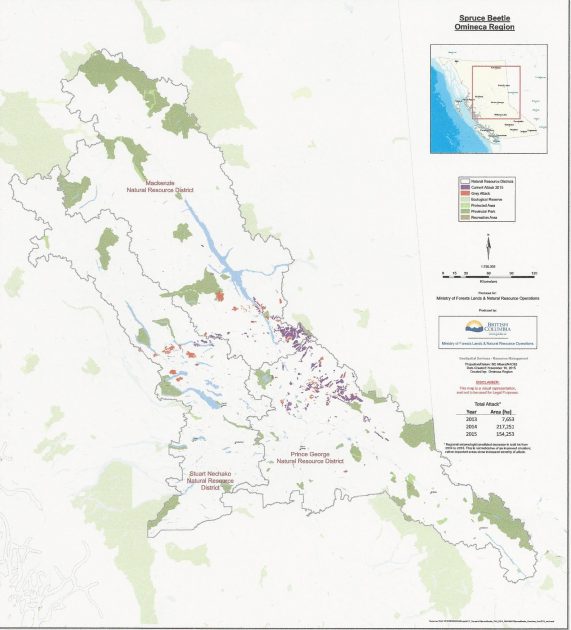Waging War on the Spruce Beetle
Prince George B.C. – The battle against the Spruce Beetle is in full force, but it will be fall before it’s known if the epidemic has been stemmed.

( at right, areas marked in red are already ‘grey” while purple areas are considered ‘current attack’ – map courtesy Ministry of Forests)
Trees infested by the Spruce Beetle can take a year to 18 months to show signs they have been attacked. Infested trees can change colour from green, to yellow to red or they can have a green and healthy crown to losing all their needles. “It’s very hard to detect these trees from the air” says Heather Wiebe, Manager of the Omineca spruce beetle project . That’s why there is an aerial survey with a fixed wing aircraft, followed by helicopter review, and finally a ground survey.
“This file is about minutes and inches, the timing is crucial” says Wiebe “We get the information, let’s say, at the end of August, and we want all of the ground probing to be done before snowfall and we want licensees to be putting down trees during snowfall, so it has to be done so very quickly.”
As devastating as the Mountain Pine Beetle attack has been, the good news says Wiebe is there are lessons learned from that infestation that can be applied to the current battle ” This is one of those files that brings people back from retirement. We have one of the entomologists who had worked on the Mountain Pine Beetle and Spruce Beetle in the past coming out of retirement to provide assistance. We have Pine Beetle bosses who had moved off to do other jobs in contact with me sending me updates and lessons learned, and we’re well connected with other places throughout North America where outbreaks have happened in the past. ”
In addition, she says licensees, First Nations and the general public are already very involved and it has been less than a year since the outbreak was first designated. In the case of the Mountain Pine Beetle it took at least two years to bring everyone together.
Licensees have been responsive to harvesting in the areas identified as being infested, in what is called a “sanitation harvest”. Those cut areas are then assessed the following year to see if the sanitation harvest has been successful, or if more treatment is needed.
Another method being used to battle the beetle is to cut down a healthy mature tree and place it in the shade. “These trap trees suck up the beetles like a sponge” says Wiebe. The trap trees are either sent to the mill or bucked and burned “That will kill all the population that’s inside that tree.”
The spruce beetle naturally occurs in spruce forests, but there are a number of things which have allowed this situation to reach epidemic proportions. When the Mountain Pine Beetle attacked, the focus was on pine and getting the most value from those trees, so spruce stands were not on the radar. The success in wildfire suppression is also a factor says Wiebe “But what trumps all of that is climate change. If we had the cold winters that kill off the bugs, they, like the pine beetle, will form their own anti-freeze, and if you have those cold snaps when they’re vulnerable, that brings down the population , if we had summers that were wetter, these trees would be healthier and would be able to ‘pitch the bugs out’, so it really is a combination of all these things, it is a perfect storm.”

Comments
Why transport any of the infested trees to any of the mills? Remember the pine beetle infestation behind Dunkley Forest Products? Shouldn’t they burn the trees where they fall? Why fly around with planes and helicopters if they can’t detect anything anyways? A year from now I am going to see red trees on my property again and I am not in the northern or eastern districts.
I wonder whether the release of sterilized male beetles is being considered?
Comments for this article are closed.